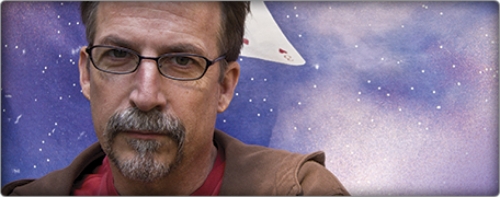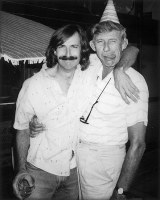Daniel Wallace never thought he’d be a novelist. The prospect seemed so unlikely that he left college to work for his dad. Years later, in 2002, he was brunching with movie director Tim Burton, who was basing a film on Wallace’s novel, Big Fish, the quirky but poignant story of a son trying to know his dying father. The book — a series of myths, mostly — became a best-seller.
Today Wallace teaches creative writing full-time at UNC and is the author of four novels. His latest, Mr. Sebastian and the Negro Magician, is a story of perception — or misperception — that’s narrated by the most bizarre but lovable circus freaks one magician could ever hope to know. There’s Jenny the Ossified Girl who can’t move any part of her body except her mouth. There’s Rudy the Strongman who isn’t really that strong without the whisky. There’s J.J. the Barker, ringleader of Jeremiah Musgrove’s Chinese Circus, which isn’t actually a Chinese circus. They all tell the story of one Henry Walker, who might be the worst magician ever, or the best. He might have sold his soul to the devil. He might be able to raise the dead. It’s tough to know anything for sure. Wallace’s tale gets more perplexing as the point of Henry Walker’s tragic life comes to light. By the end, you’re left wondering how the heck Wallace pulled off such a trick.
Despite his kooky imagination, Wallace’s decision to leave UNC in 1982 was based on his logical perception of reality. An English and philosophy major, his creative writing potential didn’t overwhelm his professors. None of them pulled him aside to say he could or should be a writer. His talent, it seemed to him, was marginal. And his dedication was suspect. He assumed he’d wind up working some sort of job in the business world. So he cut to the chase and left Carolina to join his father’s import/export business in Japan. He stayed there for two years, making good money, until his father gave him an ultimatum: fully commit to the company with an eye toward taking it over one day, or leave.
“I quit,” Wallace says. “Or I was fired, depending on who you talk to.”
He came back to Chapel Hill to give writing a shot. “As far as being called to write, or chosen, or feeling as though I had something to say,” Wallace says, “there’s nothing like that. It’s all very selfish. I just like to write.” But it didn’t come easy.
Still in his twenties, he read novels and how-to books and wrote all day long. After a year he still hadn’t found any takers for his short stories. But then he read an article in Esquire about Gordon Lish, senior editor at Alfred A. Knopf, who had published Raymond Carver, Barry Hannah, Richard Ford, and many others before anyone had heard of them.
“I really needed to figure out where I stood as a writer,” Wallace says, “and Lish seemed like a guy who would tell me the truth and maybe give me some direction.”
Wallace wrote Lish a letter, asking to join his summer seminar at Columbia University. Lish wrote back, telling Wallace that working hard is more important than having talent. Promise to work hard, Lish said, or stay home. Wallace packed for New York.
“Lish’s idea was that he knew how to write; we didn’t,” Wallace says.
There was no writing workshop where students took criticism from peers. Instead students read their stories aloud, and Lish stopped them when he got wind of a troublesome sentence. At that point, the story was dead, never to be read to the end. Then they’d talk for an hour about why that sentence stunk. No one made it past the first sentence on their first try, and lots of students dropped the class. Wallace loved it.
“The main thing that class showed me is that in order to write anything — a story, a novel, a trilogy — it has to happen sentence by sentence,” Wallace says. “Each one has to pass your own personal test of goodness. And if you’re not present for every sentence, then sooner or later everything is going to fall apart.
“I looked back at older stuff I had written and could see a sort of nonchalance. A lot of sentences just didn’t mean anything, didn’t push the story forward, or weren’t thought through. There wasn’t anything interesting about them. So I started looking at stories not as whole pieces but as collections of sentences. And that changed everything.”
Wallace eventually conquered Lish; he made it to the end of two stories. And Lish pulled Wallace aside to tell him to keep at it; his hard work was paying off.
Wallace published three short stories from that class, and several more in subsequent years. An agent named Lisa Bankoff took notice and told Wallace that if he ever wrote a novel, she’d love to read it. He wrote one, and Bankoff loved it. But she couldn’t find a buyer. He wrote two more books that Bankoff didn’t like and a fourth that she really didn’t like. He wrote five in all but remained unpublished as his thirty-eighth birthday approached. Fortunately he and his wife at the time had a successful business — they sold Wallace’s drawings, usually for refrigerator magnets. So they didn’t depend on income from his writing.
“The first book did come close to being published, but if it had, I think it would’ve been pretty bad for whatever career I was going to have,” Wallace says. “It wasn’t a good book. It was disjointed. If you were to read it, you’d say, this is somebody’s first book. And I think one of the reasons why Big Fish works, and still works for me, is that it’s not a first book; it’s a sixth book.”
So Big Fish was a product of years of practice. But at first, it wasn’t supposed to be a novel at all.
Back in 1997, Wallace was taking care of his one-year-old son Henry. When Henry napped, Wallace wrote. And, fascinated with Greek mythology, he started spinning myths about one character.
“I knew what it took to write a book, the amount of concentration and time, and the way a storyline has to stay in your head for a long time,” he says. “I knew I couldn’t do that when I had a son, so I didn’t want to set myself up for failure. I was buying time, just writing, kind of like working out for a sports event that may or may not happen.”
But after mythologizing different periods of this man’s life, Wallace began to see that his stories composed an arc: stories from childhood, stories of a married man.
“That’s when I got the idea that if I wrote more of these stories and filled in the missing pieces of this guy’s life, it could be a book.”
At the center of Big Fish is Edward Bloom, a dying father who told so many stories that his own life became a collection of tall tales. Edward once saved his hometown from a cave-dwelling giant that ate livestock and pets and possibly people. Edward was a businessman, so successful that he purchased a whole town but didn’t change one bit of it because he liked it just the way it was. Everyone loved Edward, and so did his son, William. But every time William tried to get to know his father, Edward told jokes and hid behind stories.
Wallace finished Big Fish around the time his dad, a charmer in his own right, went to the hospital for a quadruple bypass. He never came out. All he knew of Wallace’s life as a writer were those five unpublished novels. He never thought his son would find success as a novelist. Although he had been close to Daniel, he had always wished his son had taken over the family business.
“I think he’d be happy now,” Wallace says. “He probably would’ve gotten more press during Big Fish than I did because he would’ve claimed kinship with the father.”
Big Fish found an audience, he says, probably because lots of people have an Edward Bloom in their lives. But Wallace also says that he finally stopped trying to write a book that he thought others would want to read and concentrated instead on telling a story he’d want to read. His voice came through more clearly. His style took shape.
Screenwriter John August liked Big Fish so much that he told Sony he wanted to write an adaptation. Sony executives read the book, but didn’t see a plot that would translate to the big screen. They hesitated. But August, who had already piled up ideas for his script, kept prodding Sony, which finally relented.
This process was kind of backwards for Hollywood, Wallace says. Typically, production companies buy the rights to a book they think can be adapted to the big screen relatively easily. Then they find a screenwriter. Without August pushing Sony so hard, Big Fish would probably never have been made into a movie. Nor would it have been made if August and the producers couldn’t find an A-list director. At the top of their list was Tim Burton, the director of several fantastical films. Burton loved the screenplay. So did Wallace, who wound up with a cameo as an economics professor.
The theatrical success of Big Fish in 2003 didn’t change much for Wallace, except that he could afford to buy a house in Chapel Hill, where he still lives with his wife Laura and their son Henry. Today his writing supports him only if he keeps getting published, which, he says, is not a foregone conclusion. All he knows for sure is that he’s worked hard to get to this point in his life, and that he likes how he feels when he writes. So that’s what he does.
Now, he’s working on another novel.
“There’s no father or magician. It’s about two sisters. One is blind and the other’s not. But I have no idea where the story is going. This morning I wrote seven hundred words, which is great for me. It justifies the rest of my day. Actually, I think I stopped in the middle of a sentence.”
Daniel Wallace is the J. Ross MacDonald Distinguished Professor of English in the College of Arts and Sciences.




